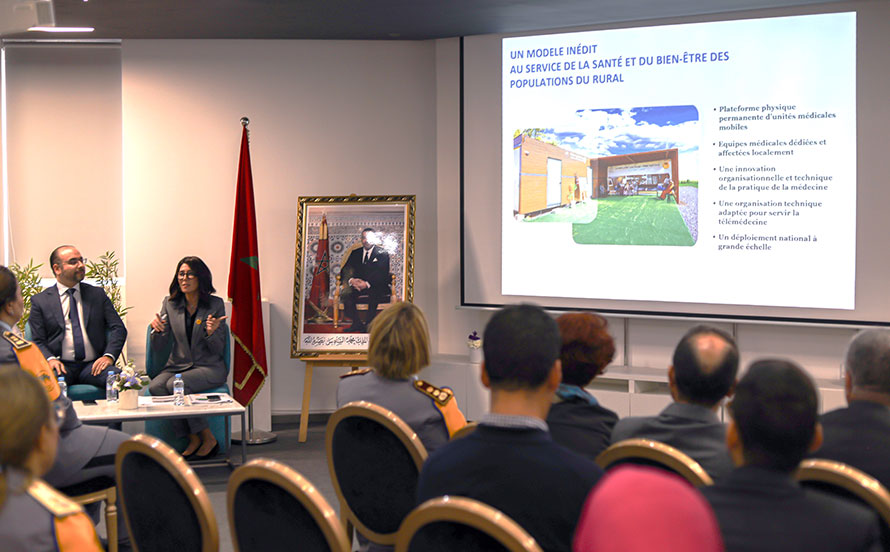Back to the List
The Foundation unveils the Connected Mobile Medical Units Program – Mohammed V Foundation for Solidarity


The Mohammed V Foundation for Solidarity unveiled the completed implementation of the Connected Mobile Medical Units - Mohammed V Foundation for Solidarity program (UMMC – FMVS) on Tuesday, February 13, 2023, in Casablanca.
A project of general interest, the UMMC–FMVS program aims to improve the efficiency of medical organization and care for populations from regions underserved by health infrastructures. The program was designed with a unique intervention model whose objective is to satisfy the health needs of these populations and contribute to their wellbeing. This is based on organizational innovation in medical practice via telemedicine, the continued mobilization of dedicated medical skills and significant technical resources. And this, according to a large-scale operational configuration which makes it possible to provide medical services to a large number of people.
On October 28, 2023, His Majesty King Mohammed VI, may God help him, launched this new digital mobile health system dedicated to the rural population, through the signing of the framework implementation agreement by the three stakeholders: The Foundation, the Ministry of Health and Social Protection and Mediot Technology.
On January 30, 2024, the deployment phase was completed. The fifty (50) UMMC – FMVS planned by the program are all operational, and welcome patients from the douars in the surrounding areas of the projects.
Thirty-four provinces are served, including nine regions of the Kingdom (Oriental: 6 provinces, Tangier-Tetouan-Al Hoceima: 3 provinces, Fez-Meknes: 5 provinces, Rabat-Salé-Kénitra: 1 province, Beni Mellal-Khénifra: 2 provinces, Casablanca-Settat: 2 provinces, Marrakech-Safi: 7 provinces, Souss-Massa: 3 provinces and DraaTafilalet: 5 provinces).
All UMMC-FMVS were the subject of field visits by Mr Mohammed El Azami, Chargé de mission at the King’s Office and Member of the Board of Directors of the Foundation. These visits made it possible to evaluate the geographical coverage and the smooth running of the activity of the UMMC–FMVS. It was also an opportunity to raise awareness among local authorities of the scope of the program and their support for the success of this Royal project.
Created as integrated modules, each UMMC–FMVS includes a specially designed and equipped medical block, a reception area as well as waiting and rest areas which create the right conditions for the patient experience.
The medical block is made up of two multi-purpose consultation and treatment areas, equipped with basic medical instruments, medical equipment, a networked system and a complete range of latest generation of biomedical equipment (networked examination devices, panoramic tele-expertise cameras, medical applications, touch screens and Visio-station) which serve as working tools for remote consultations.
Operations are supported by dedicated teams including a general practitioner, two nurses and an administrative resource. This team is assigned locally for the entire period of activity of a UMMC–FMVS. The team takes care of face-to-face general medicine consultations including examinations, diagnoses, prescriptions and delivery of medication and remote specialized tele-expertise. Additionally, ambulatory care procedures such as small surgeries, nebulization, etc. and monitoring of public health programs including maternal and child health, vaccination, screening for breast and cervical cancer, diabetes and high blood pressure are offered. Access to the UMMC–FMVS is free and open from Monday to Friday, from 9:00 a.m. to 6:00 p.m.
As for tele-expertise, the general practitioner determines when a case requires advice or assistance with examinations. In these cases, the practitioner calls on a specialist doctor who operates from a central telemedicine platform. The specialists are networked to all UMMC–FMVS program. The Visio-station then makes it possible by establishing direct contact with the expert according to the required specialty including gynecology-obstetrics, pediatrics, endocrinology, dermatology, ENT, cardiology, pulmonology and nephrology. The specialists can conduct examinations and analyze any situation, thanks to the video streams coming from the remote units and the images transmitted by the networked equipment. The general practitioner then follows the direction as a remote implementor, therefore becoming the physical extension of the specialist's intervention.
Since the first UMMC-FMVS was commissioned, 73,364 people including 46,219 women have been able to benefit from various medical services. 60,778 were the subject of consultations and general care, and 5,967 procedures required the use of tele-expertise in the different specialties available.
